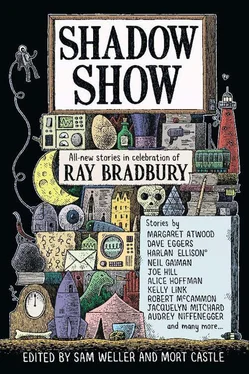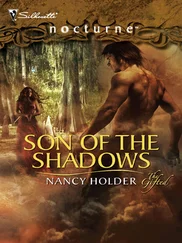MacGregor, too, would miss many things about Earth, especially the familiar objects from his house and his desk at work, the way his tools felt in his hands, but he knew that for him the memories of the objects could suffice in their absence. MacGregor would miss Silvie most of all, but he could take comfort in the memories of her that he would carry into space. Behind and beyond the rocket, there stretched the vision of MacGregor’s own planet’s beauty: a glittering silver desert and purple mountains. Beyond that, somehow, defying the laws of perspective, he could see the vast and shining ocean. From a high cliff, a giant bird launched itself, flew across the water on golden wings, and on the bird’s back was a young woman. Her arms were wrapped around the creature’s neck. Her hair whipped around in the wind, and she was laughing. At first he thought it was Silvie, hoped it was Silvie, but when she shook her head to get her hair out of her eyes, he saw that she was wearing glasses and that they were held fast to her head with an elastic strap, like the one he’d worn as a kid. MacGregor laughed with delight, realizing as he did so that he hadn’t felt delighted in quite a while. He fell backward against the door, and it rattled.
“Gerald?” Silvie called from the bedroom, and MacGregor’s heart seized.
“I’ll be right out,” he said just loudly enough to be heard, trying to not interrupt the flow of the story. The golden bird vanished behind a hill.
“I’m worried about you, Gerald. Please come out and talk to me,” Silvie said. She jiggled the doorknob, and the tissue fell out of the keyhole and onto the floor.
“Just a minute,” he whispered. When he was experiencing a story in this way, he knew how life could be extraordinary, how the simple four-chambered human heart and the primitive human brain could begin to understand the universe. And he thought that if Silvie would watch the story unfold with him—if she could shake her fears about how it might end—she would feel inspired as well. The rocket blasted off with a flame more brilliant than a lightning strike. MacGregor gripped the sink as the rocket tore free of the earth with a violence that seemed more than the rocket or the planet, or he himself, could endure—his heart felt nearly wrenched from his chest, and he was out of breath by the time the rocket was airborne. As he watched in the mirror, he could see magnificent Earth from space, its blue oceans and green lands still beautiful despite the pollution and all the other human folly that threatened to destroy it. As the planet shrank to the size of a marble, then a pale blue dot, the scene darkened, and then the rocket was swimming far from home, through the sea of stars. MacGregor kept hold of the sink to steady himself against the joyful energy of barreling through space.
“Are you looking at that tattoo?” Silvie asked. He could tell from her voice that her face was pressed up against the other side of the door.
Silvie had done so much for him. She had carried him through the grief of losing his parents. She had supported him as president of MacGregor Ball Bearing Inc., though she was better suited to run the company than he was. It was her ability to manage money, employees, and schedules that had allowed him to be anything more than an engineer.
“We need to get you some help, Gerald,” Silvie said thoughtfully.
MacGregor tore his eyes away from the mirror. He looked down at the tiny hexagonal tiles that made up the old floor, the same cool tile his bare feet had known when he was a kid. There was a slight rise near the radiator, where the floor had buckled, reminding him of a shoulder blade. As he studied the tiles, he began to see a vision move across the floor. The picture was not as vivid or colorful as his tattoo, but it played out in shadows that brought him feelings from a long time ago. Some boys filled a bottle with dry ice, shook it up, and shot a cork across a pond. They sent a model rocket two hundred feet into the air in the field behind his house. MacGregor both saw and felt himself riding his bike along the sidewalk and then gathering speed on the downslope, and though the adult MacGregor knew the poor boy was headed for a crash, he grinned at the wind in his face. MacGregor still felt like that kid, twenty-one years later.
“I saw a giant bird flying over the ocean, Silvie,” MacGregor said as he stepped into the bedroom. “Big enough that a girl was riding on its back.”
“Oh, Gerald,” Silvie said tiredly, “we both know what’s going to happen.” She was sitting on the bed with her back to him, and the bed was already made up. She wore the pearl-colored bathrobe she kept at his house.
“What do you mean?” he asked.
“The rocket always crashes. The volcano always explodes and kills the villagers. I don’t want to see a girl plunge into the icy depths.”
“This is a new story. Things might be different.”
“Gerald, we’ve been through this. The lions in the veldt tear apart the sweet little gazelle. Cold, empty space swallows the astronauts. Somebody is going to shoot that big bird out of the air. I’ve lived with your stories for more than six months, and my hope has run out.”
“The rocket doesn’t always crash,” MacGregor insisted. “And the gazelle is the lions’ natural prey—that can’t be helped.”
“If the rocket doesn’t crash, if the astronauts land safely, then in the next story they go on to kill the peaceful inhabitants of the new planet with their human stupidity.”
“Oh, honey,” MacGregor said. “So what if some of the stories don’t exactly end happily? I just wish we could watch together, to experience the adventures together, the good and the bad.”
The sun was rising outside their window, and Silvie’s shiny bathrobe exploded with color. Shapes began to form across her shoulders, and MacGregor began to see a vision of himself and Silvie in the future. Her hair was white, and his was gray, and they were holding hands in the garden in spring. He didn’t understand how this was happening, how the stories were stretching beyond his own body, appearing all around him. In the vision, MacGregor clung with his free hand to a walker. White-haired Silvie lifted both hands to her head, groaned, and then collapsed to the flagstone path to lie among the tulips and daffodils.
Silvie gave no indication that she was seeing the images on her robe.
“I need my stories to be happily ever after,” she said. She picked up the novel from her nightstand and held it in MacGregor’s direction until her bookmark fell out. He saw on the cover a muscular, shirtless man with long hair and a woman with soulful eyes and even longer hair. “Why can’t you create a happily ever after for me?” she asked, tears glistening in her eyes.
“But the stories exist on their own, Silvie. They come to me just as they are.” He felt as though he were mainly a conduit for the stories, but maybe he was, somehow, creating them. Maybe his very nature was creating them. And maybe there would be a way to control them by force of will, but that wasn’t what he wanted.
“Gerald, I don’t think I can’t live with you this way.”
“What can I do, Silvie?”
“I’ve been thinking about it,” she said, and stared out the window. “And I don’t think I can marry you unless you have the tattoo removed.”
MacGregor’s heart thudded and slowed. He stumbled into the bathroom and looked in the mirror, and there he saw the color drained from his skin, saw the brilliant visions replaced by a web of scar tissue, the explosion of life replaced by an expanse of angry flesh that pinched and stretched like the residue of a life-threatening burn. He felt physically ill. He bent at the waist, crossed his arms over his chest. He knew what Silvie didn’t know, that the tattoo was more than ink on skin. The tattoo could not be removed without gouging out his heart.
Читать дальше



![Lord Weller - Ритера или опасная любовь [СИ]](/books/421202/lord-weller-ritera-ili-opasnaya-lyubov-si-thumb.webp)








